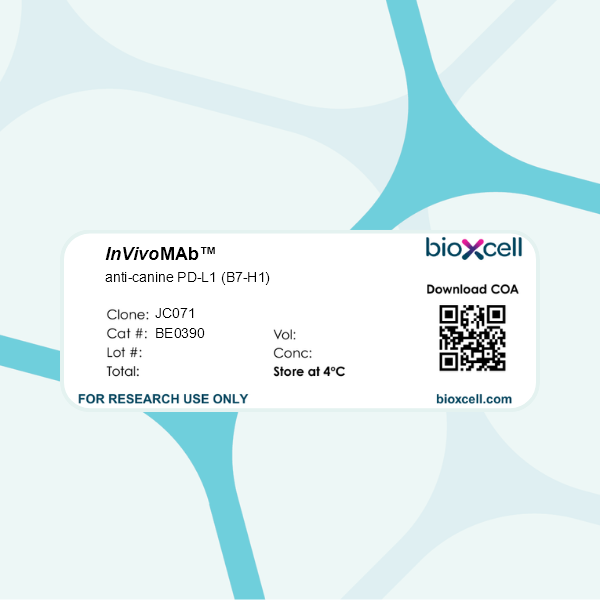InVivoMAb anti-canine PD-L1 (B7-H1)
Product Description
Specifications
| Isotype | Mouse IgG1, κ |
|---|---|
| Recommended Isotype Control(s) | InVivoMAb mouse IgG1 isotype control, unknown specificity |
| Recommended Dilution Buffer | InVivoPure pH 7.0 Dilution Buffer |
| Conjugation | This product is unconjugated. Conjugation is available via our Antibody Conjugation Services. |
| Immunogen | Recombinant canine PD-L1-Ig fusion protein |
| Reported Applications |
in vitro PD-L1 blockade Functional assays Western blot Flow cytometry |
| Formulation |
PBS, pH 7.0 Contains no stabilizers or preservatives |
| Endotoxin |
≤1EU/mg (≤0.001EU/μg) Determined by LAL assay |
| Purity |
≥95% Determined by SDS-PAGE |
| Sterility | 0.2 µm filtration |
| Production | Purified from cell culture supernatant in an animal-free facility |
| Purification | Protein G |
| Molecular Weight | 150 kDa |
| Storage | The antibody solution should be stored at the stock concentration at 4°C. Do not freeze. |
| Need a Custom Formulation? | See All Antibody Customization Options |
Application References
in vitro PD-L1 blockade
Functional Assays
Western Blot
Flow Cytometry
Choi JW, Withers SS, Chang H, Spanier JA, De La Trinidad VL, Panesar H, Fife BT, Sciammas R, Sparger EE, Moore PF, Kent MS, Rebhun RB, McSorley SJ (2020). "Development of canine PD-1/PD-L1 specific monoclonal antibodies and amplification of canine T
PubMed
Interruption of the programmed death 1 (PD-1) / programmed death ligand 1 (PD-L1) pathway is an established and effective therapeutic strategy in human oncology and holds promise for veterinary oncology. We report the generation and characterization of monoclonal antibodies specific for canine PD-1 and PD-L1. Antibodies were initially assessed for their capacity to block the binding of recombinant canine PD-1 to recombinant canine PD-L1 and then ranked based on efficiency of binding as judged by flow cytometry. Selected antibodies were capable of detecting PD-1 and PD-L1 on canine tissues by flow cytometry and Western blot. Anti-PD-L1 worked for immunocytochemistry and anti-PD-1 worked for immunohistochemistry on formalin-fixed paraffin embedded canine tissues, suggesting the usage of this antibody with archived tissues. Additionally, anti-PD-L1 (JC071) revealed significantly increased PD-L1 expression on canine monocytes after stimulation with peptidoglycan or lipopolysaccharide. Together, these antibodies display specificity for the natural canine ligand using a variety of potential diagnostic applications. Importantly, multiple PD-L1-specific antibodies amplified IFN-γ production in a canine peripheral blood mononuclear cells (PBMC) concanavlin A (Con A) stimulation assay, demonstrating functional activity.

